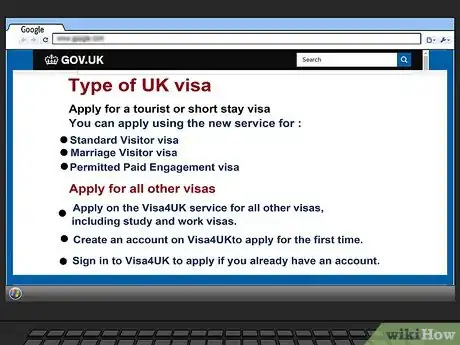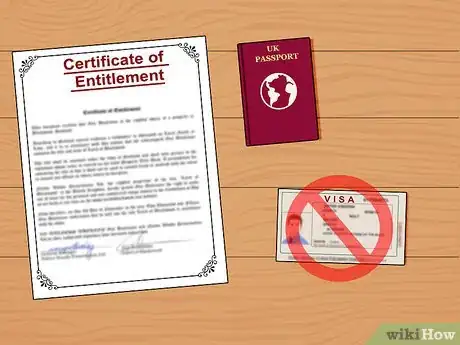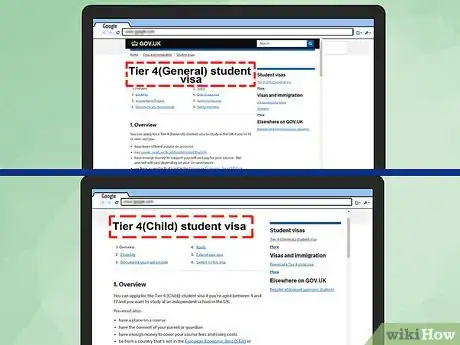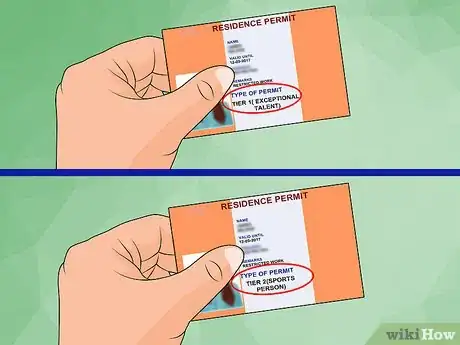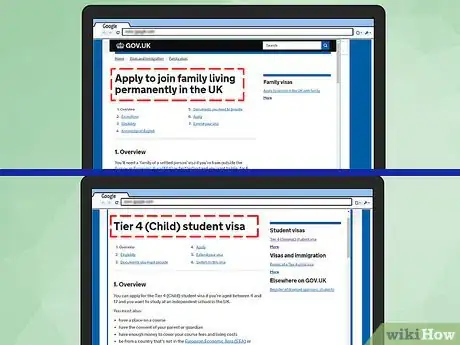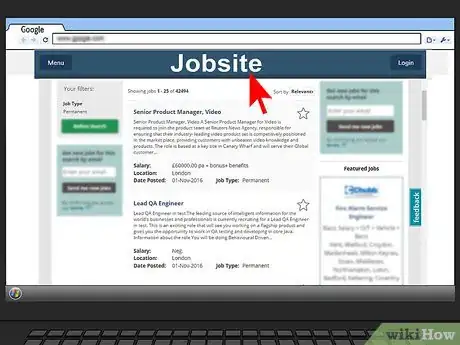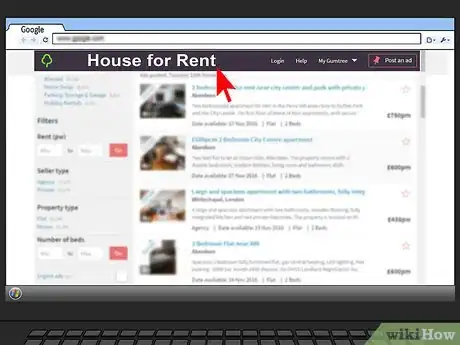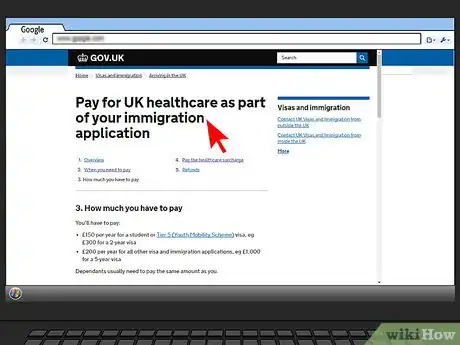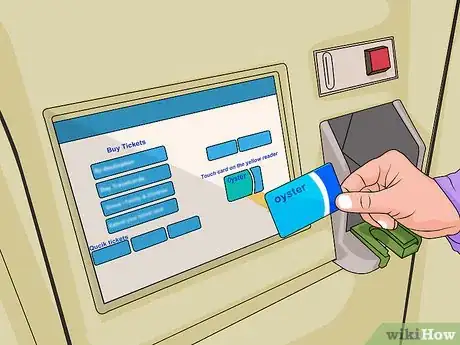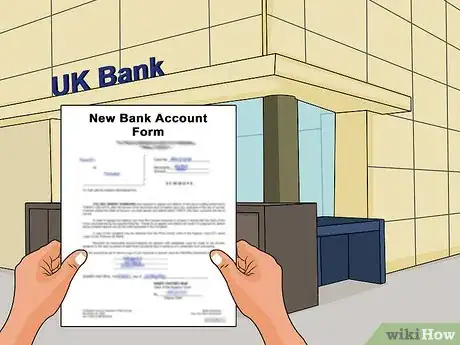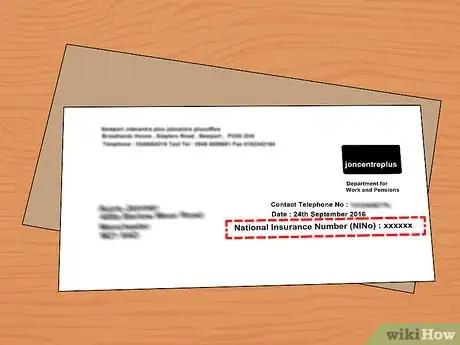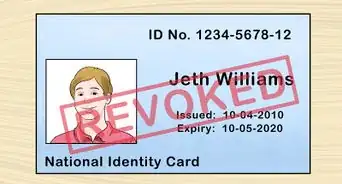This article was co-authored by wikiHow Staff. Our trained team of editors and researchers validate articles for accuracy and comprehensiveness. wikiHow's Content Management Team carefully monitors the work from our editorial staff to ensure that each article is backed by trusted research and meets our high quality standards.
There are 13 references cited in this article, which can be found at the bottom of the page.
This article has been viewed 144,473 times.
Learn more...
The United Kingdom (UK) is made up of England, Scotland, Wales, and Northern Ireland and is a highly desirable location to live. There are many reasons to migrate to the UK, whether you have a love for the culture, an exciting professional opportunity, are enrolling in an institution, or are simply wanting to relocate. A large amount of accessible information is available that can help you determine and understand which migration process is right for you.
Steps
Finding Opportunities to Migrate to the UK
-
1Familiarize yourself with the UK’s visa options. The UK offers a wide range of visas, from temporary travel to more permanent relocation. The UK’s government website has a useful tool that will help you figure out what visa you are eligible for and what documents you’ll need to apply. Almost everyone migrating to the UK will need a visa of some kind, and many visas are dependent on where you are migrating from and your intentions for moving to the UK. Having a clear idea of why you’d like to move to the UK will help narrow down your visa options.
- Once you’ve determined which visa is right for you, apply for a visa here or enlist the help of a third party migration service like VisaFirst.
- You may be eligible to apply for permanent settlement in the UK if you have claimed asylum as a refugee, under humanitarian protection, are stateless, or would like to reunite with your family. Consulting the UK’s section on settlement will help provide you with the necessary information to see if you can apply.
- If you apply for a visa to stay in the UK for longer than 6 months you’ll also receive a Biometric Residence Permit stating the conditions of visa and often your National Insurance Number.[1]
- Visas take time to process. Allow several months between applying for a visa and your move.
-
2Learn about the rights of citizens in the EU, EEA member states, and OCT. You do not need to apply for a visa to live in the UK if you are a national of the European Union (EU), citizen of member states in the European Economic Area (EEA), including Iceland, Norway, Liechtenstein, or Switzerland, or a citizen of an Overseas Country and Territory (OCT).
- You have the right to abode if you are a British Subject or Commonwealth citizen. EU, EEA, and OCT citizens only need to show their passport, but applying for a certificate of entitlement will help with applying for future benefits.[2]
- Keep in mind that the UK voted to leave the EU, also known as Brexit, on June 23, 2016, which could cause significant changes to the EU freedom of movement rules currently in place. The referendum agreement takes approximately two years to complete, which means the UK won’t officially sever ties with the EU until 2018 at the earliest.[3]
Advertisement -
3Enroll in an educational institution. Student visas are quite common, but they come with a few restrictions. It is assumed that your time as a student will be finite, which, at most, only gives you up to one month to live in the UK before beginning your time as a student and up to four months after you’ve finished.[4]
- Tier 4 (General) visas allows students over the age of 16 who are enrolled in a Tier 4 sponsored institution to live in the UK for no more than four months after the completion of their study.[5]
- Tier 4 (Child) visas allow for children between the ages of 4 and 17 who are enrolled in an educational institution to live in the UK with the consent of a parent or guardian.[6]
-
4Apply for a work visa. In order to apply for a work visa you’ll first need to find an employer who is willing to hire you. There are many visas for new long-term employment, transfers within multinational companies, temporary employment, and unpaid volunteering. Contact your employer, or reference this list of work visas, to see what visa will suit your employment terms best.
- Tier 1 work visas generally apply to those who show exceptional promise or talent in their field, multimillion dollar investors, or entrepreneurs with access to at least 50,000 GBP of investment funds.[7]
- Tier 2 visas are for skilled employment, celebrities, sportsman, or ministers of religion. Most Tier 2 visas require a certification of sponsorship, which holds your employment details, as well as 945 GBP in a savings account for at least 90 days.[8]
- Tier 5 visas cover most temporary employment from charity work to overseas professional development.[9]
-
5Apply for other available visas. The UK offers many visas to families of UK or EU citizens, as well as parents whose children have UK visas. These visas are often more specialized and have specific criteria.
- Apply for a visa to join family permanently living in the UK. You can apply for this visa if you have a spouse living in the UK, need to look after family members, or be looked after by family members.[10]
- Apply for a Parent of a Tier 4 child visa if your child holds a Tier 4 visa in the UK. This visa allows you to stay in the UK for up to 12 months with the possibility of extending your stay for a further 12 months.[11]
Preparing for your Move
-
1Learn as much English as possible. The UK, although culturally diverse, is mainly an English speaking country. Although fluency is not required to work and live in the UK, having a basic understanding of reading, writing, and speaking the English language will make your transition and cultural acclimation much easier.[12]
- Enroll in an English class before you leave or see if your employer or school can provide International English classes.
- Some specialized jobs and educational institutions require English fluency. If you are uncertain if you need to take a fluency test contact your employer or school.
-
2Create a budget. Creating a detailed budget will help you organize the tasks you will need to complete before moving to the UK as well as plan your expenses once living in the UK.
- Become familiar with the types and amount of income tax you’ll have to pay once living in the UK.
- The cost of living in the UK varies, but is generally more expensive in the south and cheaper in the north.
- Use an online cost of living comparison tool to see what expenses might increase once you move.[13]
-
3Find a job. If you are moving to the UK as a part of a career move, chances are you already have a job in mind. However, if you are not sure what job you will be able to work, consider your level of fluency in English and degree of cultural familiarity with the UK. Finding a stable job in the UK will allow you more flexibility in applying for residency or switching your visa.
- Once you have found a job your employer will need to apply for a work permit on your behalf.
- Search for job openings on sites like jobsite.co.uk, reed.co.uk, monster.co.uk, or indeed.co.uk.
- Visit a British Embassy or Consulate in your country to inquire about employment options.
-
4Find living accommodations. Find temporary living in the UK at a hostel or hotel while searching for more permanent housing. If you can, start looking weeks before you arrive in the UK, and don’t sign a contract until you fully understand the terms.
- Rental prices in the UK vary from monthly to weekly payments.
- London is one of the most expensive housing markets in the world. Consider living outside of London and commuting by train.
Living in the UK
-
1Become familiar with health care in the UK. Emergency medical services are free to all in the UK. However, there are many different qualifications for more consistent healthcare options that are dependent on which visa you have. Many visas require yearly payments that provide healthcare coverage. Consult the UK government's website to see how much you have to pay for healthcare.
- It’s up to GP’s as to whether or not they will accept you into NHS coverage.
-
2Buy an Oyster card. An Oyster card is a pre-paid public transit card that will give you access to trains and buses in London without having to buy an individual ticket. You can purchase Oyster cards at most newsstands and at every train station in London.[14]
- The UK also has an efficient railway system, allowing you to travel smoothly throughout the majority of the UK.
-
3Open a bank account with a bank in the UK. Having a bank account in with a bank in the UK will reduce the amount of time you’ll need to spend on organizing your finances, particularly when it comes to paying taxes. Most debit and credit accounts are free to open in the UK. Consult one of the larger banks like NatWest, Barclay’s, or HSBC to see what account might be best for you.
-
4Get your National Insurance Number. Making sure you have a National Insurance Number is essential for maintaining employment and applying for benefits while staying in the UK on a visa. If your NIN is not printed on the back of your Biometric Residence Permit you will need to apply for one separately.[15]
- If you need to apply for a NIN contact Jobcentre Plus.
-
5Familiarize yourself with cultural differences. Although culturally diverse, particularly in larger cities like London and Manchester, culture in the UK can be quite different from your country of origin.
- Do your best to become familiar with culture in the UK by asking questions about phrases or gestures that might be confusing.
- Buy a book on UK culture or emigrating to the UK.
Community Q&A
-
QuestionMy son was born in the UK in 1994, is he eligible to stay in the UK?
 Community AnswerYes, he can if you were legally there. If he was born there but you were there illegally, he is not eligible.
Community AnswerYes, he can if you were legally there. If he was born there but you were there illegally, he is not eligible. -
QuestionCan I get a British passport through close relatives who were born in the UK and are UK citizens?
 Community AnswerNo. Close relatives, even if they are UK citizens, have little power to issue any passport.
Community AnswerNo. Close relatives, even if they are UK citizens, have little power to issue any passport. -
QuestionCan I move from Mexico to the UK?
 Community AnswerYes, it does not matter where you come. There are many people from Mexico living in the UK.
Community AnswerYes, it does not matter where you come. There are many people from Mexico living in the UK.
References
- ↑ https://www.gov.uk/biometric-residence-permits
- ↑ https://www.gov.uk/right-of-abode/apply-for-a-certificate-of-entitlement
- ↑ http://www.bbc.com/news/uk-politics-32810887
- ↑ https://www.gov.uk/government/uploads/system/uploads/attachment_data/file/540421/T4_Migrant_Guidance_July_2016.pdf
- ↑ https://www.gov.uk/government/uploads/system/uploads/attachment_data/file/540421/T4_Migrant_Guidance_July_2016.pdf
- ↑ https://www.gov.uk/government/uploads/system/uploads/attachment_data/file/540421/T4_Migrant_Guidance_July_2016.pdf
- ↑ https://www.gov.uk/browse/visas-immigration/work-visas
- ↑ https://www.gov.uk/tier-2-general
- ↑ https://www.gov.uk/tier-5-government-authorised-exchange
- ↑ https://www.gov.uk/join-family-in-uk
- ↑ https://www.gov.uk/parent-of-a-child-at-school-visa
- ↑ http://www.keepcalmandtravel.com/how-to-move-to-england-the-ultimate-guide-for-travellers/
- ↑ http://www.numbeo.com/cost-of-living/compare_countries.jsp
- ↑ https://oyster.tfl.gov.uk/oyster/entry.do
- ↑ https://www.gov.uk/apply-national-insurance-number
About This Article
To migrate to the UK, first obtain a visa, like a student visa if you plan to enroll in school or a work visa if you find a job or charitable volunteer position. After you’ve determined the length of time you want to spend in the UK and your reason for moving there, use the helpful online tool on the UK’s government website to narrow down which visa you may be eligible for. Since visas take time to process, plan on applying for your visa several months before moving. For more guidance on the migration process, including how to prepare for your move, scroll down!
